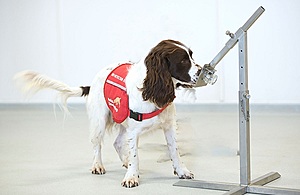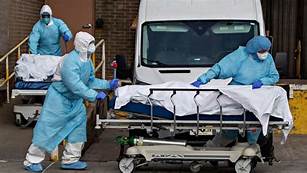COVID-19 detection dogs trial launches in UK; COVID dogs may be able to detect coronavirus in humans
Kanwar Inder Singh/ royalpatiala.in/ Chandigarh
Trials for specially-trained ‘COVID dogs’ that may be able to detect coronavirus in humans, even before symptoms appear, are set to begin as part of new research. This will establish whether they could be used as a potential new non-invasive, early warning measure to detect coronavirus in the future.
World-leading researchers at the London School of Hygiene and Tropical Medicine (LSHTM) will carry out the first phase of a trial in collaboration with the charity Medical Detection Dogs and Durham University, backed by £500,000 of government funding. This aims to determine whether dogs are able to detect coronavirus in humans from odour samples.
The trial brings together leading disease control experts from the universities with Medical Detection Dogs, who have already successfully trained dogs to detect the odour of many different diseases in humans, such as cancer, malaria and Parkinson’s disease.
This new trial will look at whether the dogs, a mixture of labradors and cocker spaniels, can be trained to detect coronavirus in people too, even if they are not showing symptoms.
Minister for Innovation Lord Bethell said: “Bio-detection dogs already detect specific cancers and we believe this innovation might provide speedy results as part of our wider testing strategy.
“Accuracy is essential so this trial will tell us whether ‘COVID dogs’ can reliably detect the virus and stop it spreading.” If successful, these dogs could provide a fast and non-invasive detection method alongside the government’s robust 5-pillar testing strategy. It is one of a number of testing measures being explored in order to ensure the government’s response to the virus is as extensive as possible.
The initial phase of the trial will see NHS staff in London hospitals collect odour samples from people who are infected with coronavirus and those who are uninfected. The 6 bio detection dogs will then undergo thorough training to identify the virus from the samples.
More than 10 years of research gathered by Medical Detection Dogs has shown that the dogs, which could each screen up to 250 people per hour, can be trained to detect the odour of disease at the equivalent dilution of one teaspoon of sugar in 2 Olympic-sized swimming pools of water.
Professor James Logan, lead researcher for the work and Head of the Department of Disease Control at the London School of Hygiene and Tropical Medicine, said:
Our previous work has shown that malaria has a distinctive odour, and with Medical Detection Dogs, we successfully trained dogs to accurately detect malaria. This, combined with the knowledge that respiratory disease can change body odour, makes us hopeful that the dogs can also detect COVID-19.
I would like to thank the UK government for their support of this pioneering research through this funding. We’re excited to do this trial, and confirm whether these bio detection dogs can be used to screen for COVID-19.
If successful, this approach could revolutionise how we detect the virus, with the potential to screen high numbers of people.
Medical Detection Dogs and the universities put forward a proposal for the clinical trial to the government, which has been accepted following strong evidence that the dogs can detect other diseases in humans with a high level of accuracy.
The dogs will only be deployed if backed by strong scientific evidence and is part of the government’s approach to explore all possible options to tackle coronavirus.
Dr Claire Guest, Co-founder and CEO of Medical Detection Dogs, said: We are delighted that the government has given us the opportunity to demonstrate that dogs can play a role in the fight against COVID-19. They have the potential to help by quickly screening people, which could be vital in the future
We have already demonstrated our expertise in canine disease detection by successfully training dogs to detect diseases like cancer, Parkinson’s and malaria, and we apply that same science to train life-saving Medical Alert Assistance Dogs to detect odour changes in individuals caused by their health condition.
We are sure our dogs will be able to find the odour of COVID-19 and we will then move into a second phase to test them in live situations, following which we hope to work with other agencies to train more dogs for deployment. We are incredibly proud that a dog’s nose could once again save many lives.
May,17,2020













